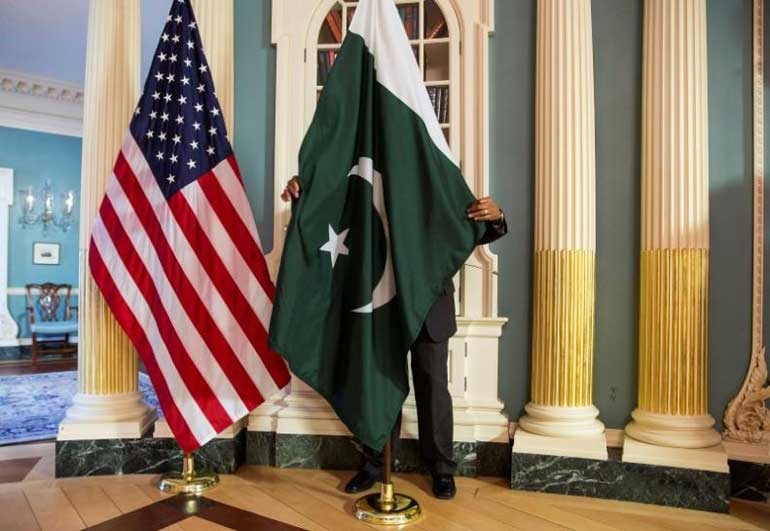A U.S. delegation is expected to visit Pakistan in the first week of August to discuss its new strategy for South Asia. According to MaryKay L. Carlson, U.S. Charge d’Affaires to India, this new policy will be taking a more ‘holistic view’ and not just focus on the U.S. bi-lateral relationships with the three countries, India, Afghanistan and Pakistan. For Pakistan, it is important to note that the strategy will underline what U.S. expects from Pakistan in its relationships with its neighbors, especially India and Afghanistan.
Historical Overview of U.S. Policy for South Asia
Although the U.S. policy towards South Asian countries has seen a lot of changes over the years, its ultimate goal to remain dominant in the region has remained intact. Initially, the U.S. policy for South Asian countries revolved around its aim to ward off communism from the region and stop South Asian countries from coming under its control, as it could affect its dominant position in the global arena.
Later, when the Soviet Union fell apart in 1991, a change in U.S. policy towards the South Asian countries, especially Pakistan, was seen, as Pakistan no longer enjoyed its favors due to its position as a US ally against its Cold War opponent. Moreover, in 1998, Pakistan and India had both successfully tested their nuclear arms, which proved to be a big concern for U.S. as it feared unstoppable nuclear proliferation in the region. The possibility of a nuclear war between Pakistan and India because of Kashmir issue was also seen as a major threat for the U.S. So during that time, its policy focused majorly on ensuring stability in the relationship between the two countries and failed attempts of resolving the Kashmir issue.
After 9/11, there was a U.S. policy shift again towards South Asia when India and Pakistan both agreed to support U.S. in its anti-terrorism coalition in Afghanistan against the Taliban and Al-Qaeda. Pakistan again began to enjoy huge amount of U.S. aid and military assistance, this time in exchange for its cooperation with the U.S. to combat terrorism. Although initially, Pakistan was praised for its efforts, after some time, the U.S. began to demand more action to stop the terrorists from finding refuge in Pakistan.
Even today, the U.S. blames Pakistan for not doing enough, especially in case of dealing with the Haqqani Network. On the other hand, the U.S. sees India as a potential market for the promotion of free trade because of its rapidly growing economy. Thus, it has shown key interest in enhancing its bilateral ties with the country, which irks the Pakistani side.
So what can Pakistan expect from the new U.S. policy towards South Asia?
Firstly, there is a popular belief that Pakistan should expect huge cut in the U.S. aid and military assistance while India will continue to receive favors in the form of promotion of free trade and arm sales. However, despite its declarations to approach Pakistan harshly for not taking adequate actions to stop the proliferation of terrorists across its borders and threatening to hold back its aid and military assistance towards it, the U.S. acknowledges Pakistan’s geopolitical importance for enhancing stability and peace in the South Asian region, especially in Afghanistan. Therefore, if the U.S. reduces its military aid to Pakistan or labels it as a non-NATO ally, it might hamper its relations with the Pakistani establishment which it cannot afford to do as long as it has its troops in Afghanistan. The U.S. needs Pakistan for providing its troops cheaper supply routes and stopping the infiltration of terrorists from its borders.
Moreover, the U.S. also understands the importance Pakistan will hold in economic terms once the China-Pakistan Economic Corridor (CPEC) is fully functional. The CPEC is a joint developmental collaboration between China and Pakistan, which aims to provide cheaper trade and investment routes to China, Russia, South Asia, Central Asia, Middle East, Africa and Europe, hence providing them numerous economic benefits. If Afghanistan and India also join CPEC, it will provide peace and stability to the region eventually, which is also what the U.S. wants. The U.S. has shown its reservations towards this project from time to time as it will enhance the dominant position of China in the region as compared to that of the U.S. But the Trump administration also realizes the economic benefits that it can achieve if it supports this project, which is why it expressed its interest in the CPEC and offered to invest in the energy sector of Pakistan. A harsher tone in its South Asian policy towards Pakistan might hamper its prospects of economically benefiting from such project.
Like previous U.S. governments, Trump administration also wants Pakistan to improve its bilateral relations with India, which have recently been on a freeze again, especially since the recent attacks on Indian base camp of Uri. The Indian government blames the attack on anti-Indian terrorist groups working from the Pakistani side of border while Pakistan continuously denies its involvement. The pro-Indian lobby in the Trump administration wants the U.S. to declare Pakistan a “terrorist state” and support Indian stance against the non-state actors operating against it from Pakistan. Moreover, India wants the Trump to follow Obama’s policy of not interfering in the Kashmir issue. It refused to accept Nikki Haley’s suggestion of direct involvement of Trump administration in bringing down tensions in its relations with Pakistan. The new U.S. policy for South Asia will show how much India has been successful in lobbying the U.S. administration to take strict measures against Pakistan.
All in all, Pakistan may expect a balanced U.S. approach towards it in its new policy for South Asia, where the U.S. will not just emphasize on enhancing its bilateral ties with Pakistan by continuing yet keeping a close check in its aid and military assistance, but also demand that the latter takes appropriate measures to improve its relations with its neighbors and counter terrorism to bring peace and stability in the region.


